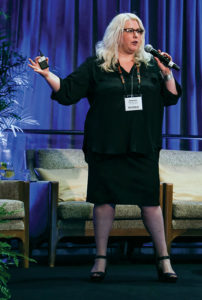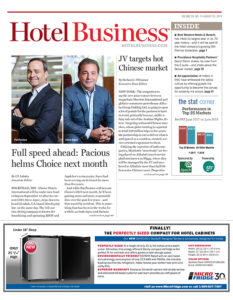WASHINGTON—At the 5th annual Revenue Strategy Summit (RSS), held here at the Renaissance DC Downtown hotel last month, industry experts took a look at current trends in hospitality—as well as future innovations that could affect the way hotels manage revenue, sell their inventory, and even who they’re selling to.
During a session titled “The View from the Street,” Michael Bellisario, senior equity research analyst, Robert W. Baird, and Shaun Kelley, managing director & senior U.S. gaming, lodging & leisure equity research analyst, Bank of America Merrill Lynch, gave insight on how Wall Street thinks about trends like interest rates, consolidation, alternative lodging and direct-book campaigns.
Bellisario noted that at some point, interest rates will have to go up. “I think the view is they’ll only go up if the economy is getting better, and if the economy is getting better, that means the hotel business should be pretty healthy,” he said, adding that hotels trade less off changes in interest rates than other real estate subsectors because their leases are re-priced nightly.
“Lease duration is the biggest determination of how focused you are on interest rates,” Kelley agreed. “So in a rising rate environment, the hotel sector is actually a good place to be.”
Certainly, one of the biggest trends in hospitality in recent years has been consolidation. “Obviously, the bellwether transaction was Marriott’s acquisition of Starwood,” Kelley said. “When we think about what has driven some of that transaction activity and what will continue to drive it, one of the biggest factors is the obvious one: scale.”
To illustrate this, he said, “The OTA contracts Starwood had struck with some of the bigger players like Expedia were somewhere in the range of a negotiated fee of around 16%. We believe Marriott’s contracts were closer to 11%. The day that deal closed, all of Starwood’s hotels rolled onto Marriott’s contract. That’s 500 basis points savings for every room night booked through that channel, which goes directly to the owner,” Kelley said. “We don’t think it’s completely lost on people that Expedia and Marriott were at the end of their negotiation when Marriott decided they were acquiring Starwood. It’s not the driver of the transaction; it’s also unlikely to be a coincidence.”
And as for those direct-book campaigns? “Initially, investors thought it was good and I still think they think it’s good,” Bellisario said. “The biggest issue I have is you’re giving someone who was already booking the right way discounts. You need to fundamentally change the way people are booking rooms. You need to go after the customer who is booking on Expedia, you need to get more information from him, you need to be more proactive when that customer checks into a hotel to find out why they went to Expedia.”
“When you lay out this direct marketing play, the risk you run is you cannibalize your highest-value customer by giving them a discount to attract your lowest-margin customer, which is the person who is shopping around,” Kelley agreed. “We heard complaints from owners about the challenge with that strategy. However, both investors and the companies themselves—and, most importantly, the owners—generally buy into this because they know it’s really important for the long-term value.”
According to the executives, Airbnb doesn’t have as much of an impact on hospitality valuations as it did in 2015. “When RevPAR growth was slowing, it was easy for an analyst to go to a portfolio manager and say RevPAR growth is slowing, Airbnb is gaining momentum, RevPAR growth will continue to slow,” Bellisario said. “But when RevPAR stabilized, that helped the stock valuations and, frankly, the biggest benefit for hotel stocks was that all the cities, municipalities and states started turning the dials up a bit on regulation and taxes. But they’re going to have to learn to coexist.”
Kelley said, “Every portfolio manager who takes a longer-term view, it’s their top question. They have to worry about the true theory of disruption.”

Stephanie Davis, founder & COO of Virtual Xperience, spoke about the future of virtual reality in the industry.
The one-day conference also focused on ways the industry will change in the future. Kalibri Labs CEO and co-founder Cindy Estis Green posed a question: How much do comp sets matter anymore? She noted that—particularly since the Marriott/Starwood merger—owners have told her that traditional comp sets don’t make sense anymore.
“It got me thinking about what needed to be looked at in terms of some of these metrics,” she explained. “Beyond net revenue, do comp sets make sense anymore? In this age of big data, can we do something a little more effective and customized for an individual hotel?
“Instead of benchmarking against the average of four or five hotels—who may or may not be good operators—maybe we should benchmark against our own optimal—the best that we can achieve,” she continued. Green envisioned a world where hotels would have a comp set of 12 or 20 hotels—but instead of looking at the competition wholesale, hotels would only look at the portions they compete on—leisure, group, weekends, etc.—to come up with better metrics.
“You have to look at what’s out there: What are the rates and room nights available? Those are the demand drivers, and you have to know them in your market. It’s a finite pie we’re all trying to go after. Then, you have to evaluate your ability and your competitor’s ability to tap that demand. But, beyond that: What do consumers say about you and what do they say about your competitor? How well suited is your product to the demand? What is the base of your demand that comes through loyalty or recognition?” she said.
“If you look at all of these factors and then assess the most net revenue I could get given these, you might come up with some numbers,” Green added, noting that when hotels are benchmarking optimal mix, they should take into account the costs of customer acquisition.
Stephanie Davis, founder and COO, Virtual Xperience, enlightened attendees on the future of virtual reality (VR) in the hotel industry. Noting that “virtual reality” is here today with mobile solutions like Google Cardboard, but that true VR—a room scale, fully immersive experience—is some two to three years out, she stressed that hotel companies should start thinking about this to get ahead of the competition.
VR will offer up new analytic possibilities, Davis said. “The idea that you could track someone’s behavior within VR is going to be almost better than reality—you’re going to be able to understand if they clicked on an ad, interacted with a certain object, or how they are thinking,” she said. “All of these behaviors can be tracked, analyzed and created into an asset.
“VR and advertising are a beautiful match. Product placement within the VR world is going to be so native,” Davis said. “You have to be smart and discreet about how you place advertisements; let’s not make this a billboard full of ads. If brands and publishers oversaturate VR with advertising, they risk souring the entire experience.”
Lee McCabe, VP, North America, Alibaba Group, also elaborated on a topic that will affect hotels’ revenue strategies—Chinese travelers. “China’s become the largest e-commerce market in the world,” he said. “By 2019, nearly a third of global shoppers will be in China. Because they’re buying so much more, 55% of global e-commerce sales will be in China.”
According to McCabe, only half of the country is online right now, meaning the other half have yet to experience the internet. “There’s only one way this can go—north,” he said, noting that by 2020, the U.S. will have 270 million online shoppers. By comparison, China will have 891 million.
“China is now the largest outbound market in the world in terms of travelers, and major cities are benefiting from that,” he said. If you don’t have a China strategy, start thinking about one.” HB

